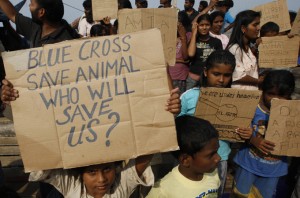Australian asylum policy has ‘racial element’
Al Jazeera, May 25 2011
The UN’s top human rights official has raised racism concerns over Australia’s policies towards asylum seekers and its treatment of its indigenous Aboriginal population. Long-standing policies of locking up asylum seekers had “cast a shadow over Australia’s human rights record”, and appeared to be completely arbitrary, Navi Pillay, the UN’s High Commissioner for Human Rights, said on Wednesday at the end of a six-day visit to the country.
“I come from South Africa and lived under this, and am every way attuned to seeing racial discrimination,” Pillay, a former anti-apartheid campaigner and international criminal court judge, told reporters.
“There is a racial discriminatory element here which I see as rather inhumane treatment of people, judged by their differences, racial, colour or religions,” she said.
Pillay held talks with Julia Gillard, Australia’s prime minister, and expressed deep concern about the ruling Labor government’s latest plan to send hundreds of asylum seekers to Malaysia for refugee processing.
She added that the country had strong egalitarian foundations which made it “disappointing that the system is failing to protect certain groups”.
“I urge the leaders of all Australia’s political parties to take a principled and courageous stand to break this ingrained political habit of demonising asylum-seekers,” she said.
Earlier this month, Canberra announced it had struck a deal with Kuala Lumpur to ensure asylum seekers caught heading to Australia would be sent to Malaysia, which is not a signatory of the UN refugee convention.
Pillay said her concerns about the Malaysian swap agreement centred on whether the bilateral agreement would provide adequate protection for refugees.
International safeguards
Under the deal, which has yet to be finalised, Australia will send 800 asylum seekers to Malaysia and, in return, take 4,000 “genuine” refugees.
Pillay warned that while there was a need to combat people smuggling, such bilateral agreements needed to comply with international safeguards.
“These include the ensuring that there is no real risk of breach of the principles of the 1951 refugee convention and the convention against torture, which Australia has ratified and Malaysia has not.”
More than 900 people, mostly from Afghanistan, Iraq, Iran and Sri Lanka, have arrived in Australia so far this year, while 134 boats carrying 6,535 people turned up last year.
While Pillay’s criticism may cause Australia some discomfort internationally, it is unlikely to convince Gillard or her political opponents to change policy, given polls showing wide voter concern about border security.
She also criticised an “intervention” policy, introduced by the former government of John Howard and continued by Gillard, which places controls on welfare spending for Aborigines to help fight alcohol and child sex abuse in remote outback areas.
“In my discussions with Aboriginal people, I could sense the deep hurt and pain that they have suffered because of government policies that are imposed on them,” Pillay said.
Australia’s 460,000 Aborigines make up about two per cent of the population. They suffer higher rates of unemployment, substance abuse and domestic violence than other Australians, as well as having a 17-year gap in life expectancy.




